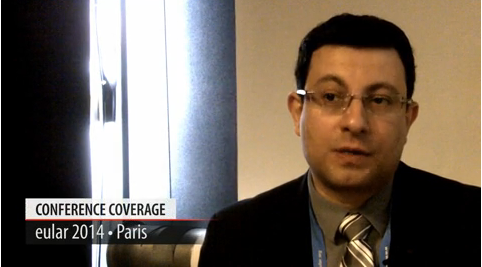User login
PARIS – When physicians withdrew immunosuppressant treatment from lupus patients in long-term remission, a gradual tapering down of their immunosuppressant treatment produced a lower rate of subsequent flares than did faster treatment withdrawal, based on experience with 99 patients treated at the University of Toronto.
"This study has answered a very important question," namely, what approach works best when taking patients with systemic lupus erythematosus who are in long-term remission on immunosuppressant therapy off their treatment, said Dr. Zahi Touma, a rheumatologist at the University of Toronto. When patients had their dose tapered down more gradually, they had a reduced rate of flares and needed less immunosuppressant therapy to restart, compared with patients who withdrew from treatment more quickly.
"This is not a validated approach. It is not yet even published," Dr. Touma cautioned during a video interview at the annual European Congress of Rheumatology. But the apparent advantage of more gradual treatment withdrawal "is something we found in this study," he said.
Dr. Touma said that he had no disclosures.
The video associated with this article is no longer available on this site. Please view all of our videos on the MDedge YouTube channel
On Twitter @mitchelzoler
PARIS – When physicians withdrew immunosuppressant treatment from lupus patients in long-term remission, a gradual tapering down of their immunosuppressant treatment produced a lower rate of subsequent flares than did faster treatment withdrawal, based on experience with 99 patients treated at the University of Toronto.
"This study has answered a very important question," namely, what approach works best when taking patients with systemic lupus erythematosus who are in long-term remission on immunosuppressant therapy off their treatment, said Dr. Zahi Touma, a rheumatologist at the University of Toronto. When patients had their dose tapered down more gradually, they had a reduced rate of flares and needed less immunosuppressant therapy to restart, compared with patients who withdrew from treatment more quickly.
"This is not a validated approach. It is not yet even published," Dr. Touma cautioned during a video interview at the annual European Congress of Rheumatology. But the apparent advantage of more gradual treatment withdrawal "is something we found in this study," he said.
Dr. Touma said that he had no disclosures.
The video associated with this article is no longer available on this site. Please view all of our videos on the MDedge YouTube channel
On Twitter @mitchelzoler
PARIS – When physicians withdrew immunosuppressant treatment from lupus patients in long-term remission, a gradual tapering down of their immunosuppressant treatment produced a lower rate of subsequent flares than did faster treatment withdrawal, based on experience with 99 patients treated at the University of Toronto.
"This study has answered a very important question," namely, what approach works best when taking patients with systemic lupus erythematosus who are in long-term remission on immunosuppressant therapy off their treatment, said Dr. Zahi Touma, a rheumatologist at the University of Toronto. When patients had their dose tapered down more gradually, they had a reduced rate of flares and needed less immunosuppressant therapy to restart, compared with patients who withdrew from treatment more quickly.
"This is not a validated approach. It is not yet even published," Dr. Touma cautioned during a video interview at the annual European Congress of Rheumatology. But the apparent advantage of more gradual treatment withdrawal "is something we found in this study," he said.
Dr. Touma said that he had no disclosures.
The video associated with this article is no longer available on this site. Please view all of our videos on the MDedge YouTube channel
On Twitter @mitchelzoler
AT THE EULAR CONGRESS 2014
